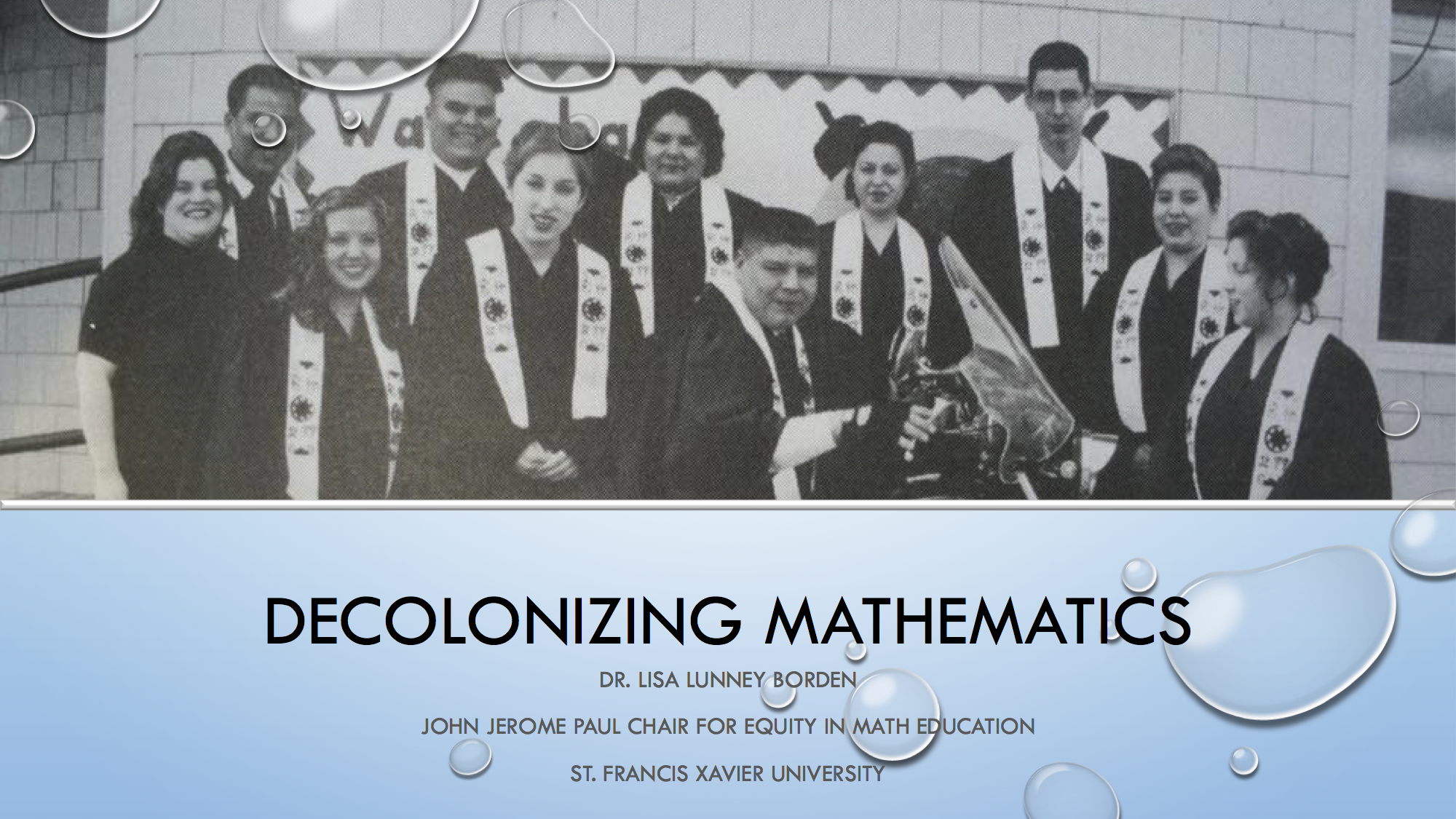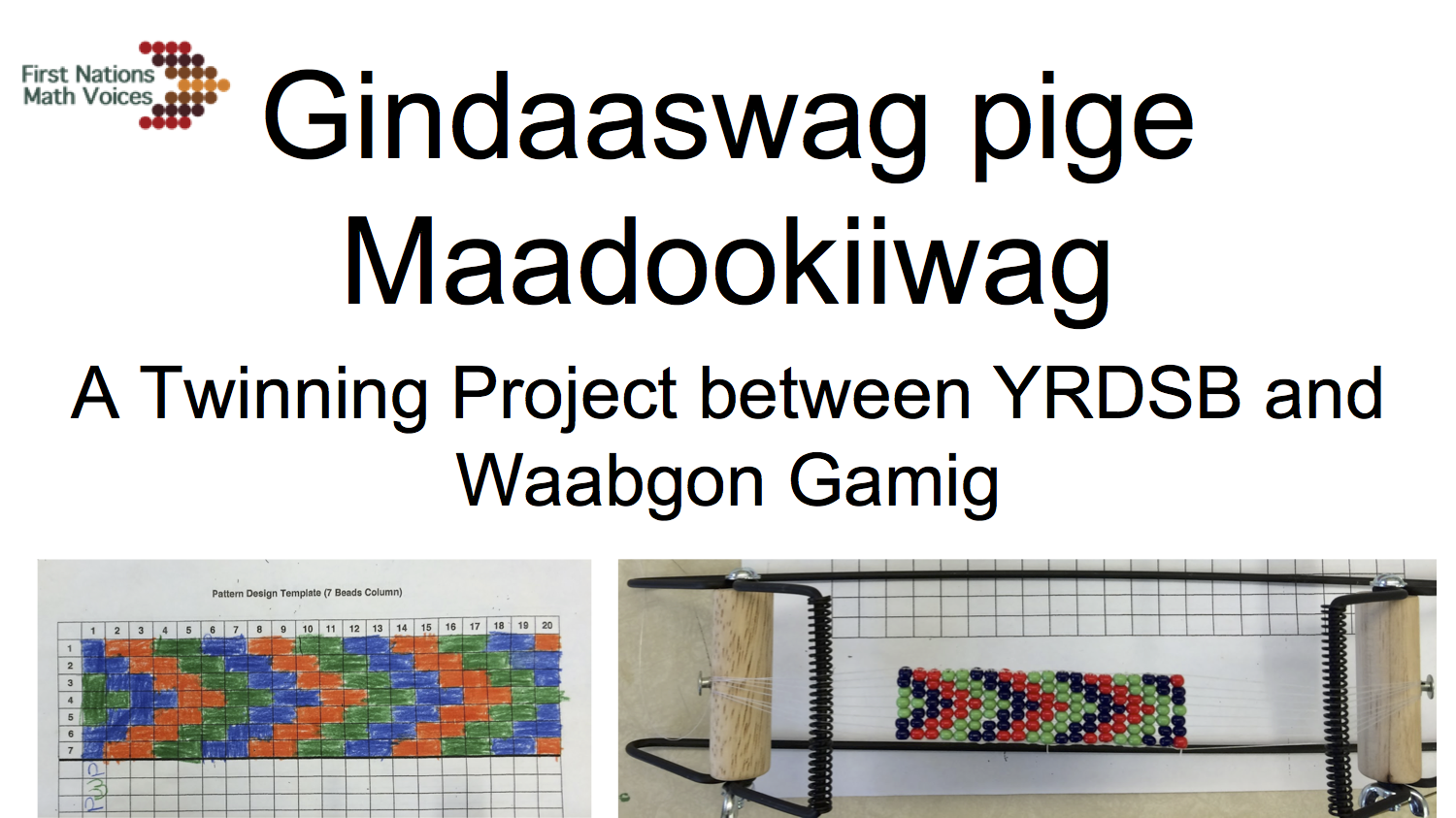Notes from our Making Connections Conference 2017
Beyond "Native Studies":
Incorporating Indigenous perspectives in math
Speakers:Lisa Lunney Borden: Associate Professor at St. Francis Xavier University Aaron Prosper: Mi’kmaq student & researcher, Dalhousie University Pamala Agawa: First Nation, Métis and Inuit Education Curriculum Co-ordinator, York Region DSB Moderator: Kris Archie, Executive Director, Circle on Philanthropy and Aboriginal Peoples in Canada |
Overview:Two of the goals identified in Ontario’s First Nation, Métis and Inuit Policy Framework are improved achievement for Indigenous students and the integration of educational opportunities so that all students have increased knowledge about the cultures, traditions, and perspectives of Indigenous peoples. To meet these goals, our schools have to go beyond offering stand-alone courses and units focused on Indigenous issues, and incorporate Indigenous perspectives and knowledge in all subjects. In this session, you will learn how this can be done in math class, and the impact it can have on students. |
Introductions
| Lisa Lunney Borden:
John Jerome Paul Chair for Equity in Mathematics at St. Francis Xavier in Antigonish (Teacher Educator) Favourite learner/Educator: (mentioned in presentation) the community of learners from her high school graduating class – still in touch with this group – reminds her of the importance of relationships to learning. |
Pamala Agawa:
Traces father’s ancestry to Agawa shore, Lake Superior lands Favourite learner/Educator: Dr. Ruth Beatty, Danielle Blair, her kids Key ideas:
|
Aaron Prosper:
Traces roots to Chapel Island First Nation (community later centralized to Eskasoni First Nation) Key idea:
Favourite learner/educator: elders in his communities (Albert Marshall, Janet Armstrong, Willie Ermine, and others), spearheaded “two-eyed seeing” concept. |
Presentations
Click the panelists names to see notes from their presentations
- Co-creator of the Show Me Your Math program

- In the MI’KMAW KINA’MATNEWEY (MK) school district, graduation rates are high, post-secondary enrollment is high, attendance is high – why? Students say it feels like home.
- Key idea: Building Capacity from within the community
- What is Indigenous math education?
- it’s NOT word problems about making a jingle dress
- What it could be: using knowledge within the community to guide activities/inquiry (i.e. measurement/calculation knowledge needed to make a cultural artifact or drum. Example project: kids design basket to learn about economical containers)
- Key idea: Exploring cultural contexts alone is not enough, educators need to pursue Indigenous ways of knowing.
- Ex: Mi’kmaq is a verb-based language – a language of motion. So in math when talking about “slope” of a line, we can talk about “how is the line moving?”
- Overall message: doing this work is about restoring what must be restored and about reconciliation.
- Gindaaswag pige Maadookiiwag, a twinning project between YRDSB school board and Waabgon Gamig School, a federal First Nations K-5 school (on Georgina Island). Connected to the 5-year long Algonquin Loom Beading project (First Nations Math Voices project)

- Visited Waabgon Gamig 3 times from Dec – April 2016 for several days at a time to work on exploring beading project with math curriculum connections. Model was “Play first, extract the math later”.
- Outcome: bringing community leaders and children together to learn in an authentic way.
- Key idea: Community is leading this learning
- Worked with Lynn Mooney (Literacy Coordinator)
- Key idea: when we lift our children and acknowledge Indigenous ways of knowing, we lift other community members as well
- Key learnings from project:
- When taking the project into the public system, needed to assess readiness (i.e. do educators have the competency in Indigenous knowledge? Do educators understand the mathematics involved?)
- Moderator question: what does it take to decolonize classrooms/schools?
- Pamala – thinking of kids’ actions and ways of being as gifts, rather than misbehaviours
- Lisa Lunney Borden – honouring children as they are, creating spaces for them to be themselves; respect the individuality of each child, don’t group them all together as “the native kids”.
View presentation slides
- Researching the links between Indigenous knowledge and the study of epigenetics
- idea of Tan Weji-Sqalia’tiek or “We sprouted from” (introduced by Francis & Sable)
- language informs your way of thinking (e.g. Mi’kmaq way of thinking of things in motion – i.e. “red fire truck” vs. “the fire truck is redding”)
- there is a traditional Mi’kmaq game called Waltes. People could be arrested for playing it up until the 1960s under the Indian Act. Aaron did a project on the math implications of this game in school, as part of the Show Me Your Math program.
- Through that project he learned significant cultural history:
- game used to be part of a water ceremony as well, but Indian Agents used to drill a hole in the pieces so they couldn’t use it for ceremonies
- this learning shows importance of culturally-based projects, even in subjects like math
- Key idea: wouldn’t be able to trace back his lineage in a specific, meaningful way if not for the MK schools
Panel Discussion
Moderator: how can we empower non-Indigenous allies/educators to continue to make the case for Indigenous-based education in their schools?
- Pamala Agawa: mandated Indigenous lead for each board – these people SHOULD be the leaders – but many don’t have connection to Indigenous communities/ancestry. In that case, educators should extend the invitation to partners outside the school board. You have to find others with the cultural connection to lead the learning – not just go to Google!
- Lisa Lunney Borden: In my experience, successful projects are rooted in long-term relationships. They didn’t start with the intent of doing research. Focus should be on building relationships as a starting place rather than building the research as a starting place.
Moderator: There is an elephant in the room – we’re inviting people to be in relationships with Indigenous communities but many non-Indigenous folks aren’t in relationships with themselves/their own history. Do you have advice for non-Indigenous people to help them foster that relationship with themselves first?
- Aaron Prosper: There is a current idea that we need to “Indigenize the academy” I fully disagree with this concept. We’re not asking you to believe our beliefs or adopt our way of life. We’re just asking you to centre and respect our beliefs/way of life as equal. We aren’t saying the Western perspective has nothing to offer.
- “Two eyed seeing” is an important concept – western perspective has something to offer, but Indigenous perspective has an equally important offering
- Key idea: Do not try to INDIGENIZE yourself – create the space for students/others to be Indigenous.
